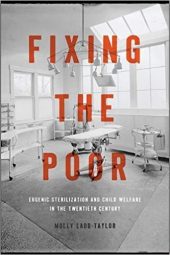The Disability History Association (DHA) promotes the relevance of disability history and facilitates research, publication, conference travel, and public history initiatives related to disability history.
The Disability History Association annually confers two publication awards: the Outstanding Book Award and the Outstanding Article/Book Chapter Award. Information about how to apply for each award, as well as past winners, can be found below.
Outstanding Book Award
As part of the Association’s 2024 Award Series, the DHA Award Committee invites entries for its thirteenth annual Outstanding Book Award. The amount of the award is $300. The winning book, as well as the book receiving the honorable mention, will be announced in September 2024.
Eligibility: Committee members welcome monographs and edited collections, provided the book is new, original scholarship and published in English. The award is open to authors writing across all geographic areas and time periods whose book was first published between January 1 and December 31, 2023. Members of the DHA Board of Directors are not eligible to apply.
Submission Procedure: In order to be considered, please send the following to the Book Award Chair Dr. Wayne Tan (tan@hope.edu) and DHA Director of Awards Dr. Jenifer Barclay (barclay7@buffalo.edu) by May 1, 2024:
- a brief cover letter that includes a full bibliographic citation for the book; and
- an electronic copy of the book in text-based .pdf or .doc file format compatible with screen reading software for the review committee.
The members of the Award Committee understand that copyright rules apply and will use the electronic copy for the sole purpose of selecting a winner. Books that are not provided in accessible electronic formats for screen reading software in a timely manner will not be considered for the prize.
Applicants will also be required to send six print copies of the book to the members of the Book Award Committee. After you submit your cover letter and electronic copy of the book, the Book Award Chair will be in contact with you to arrange for the distribution of the hard copies. If you are concerned that you will not be able to provide hard copies of the book, please let the Book Award Chair know.
Please direct any questions to the Book Award Chair Wayne Tan (tan@hope.edu) or DHA Director of Awards Jenifer Barclay (barclay7@buffalo.edu).
Outstanding Article or Book Chapter Award
As part of the Association’s 2024 Award Series, the DHA is pleased to invite entries for its thirteenth annual Outstanding Article or Book Chapter Award competition. The winning article or book chapter, as well the article or book chapter receiving honorable mention, will be announced in September 2024.
Eligibility: The award committee welcomes entries that feature new and original history of disability scholarship. To be considered, submissions must have significant historical content.
This $200 award is open to authors writing across all geographic areas and time periods. The publication must be in English, with first publication taking place between January 1 and December 31, 2023. We are conscious that some journals publish an electronic advance copy of articles that can appear a considerable time before the print copy is published; we also recognize that some journals are running behind schedule so that, for example, an article published in October 2023 might actually appear in a 2022 edition. We will endeavor to be sympathetic in cases of “behind schedule” publication. If you feel that your proposed submission should be considered but might be at risk of disqualification, please email Jenifer Barclay (barclay7@buffalo.edu) for further information.
Submission Procedure: Please send one electronic (.pdf or .doc) copy of the article or book chapter to Dr. Jenifer Barclay (barclay7@buffalo.edu) no later than May 15, 2024. In your email, please include the full bibliographic citation of your submission in the Chicago Manual of Style format.
In the interest of modeling best practice in the field of disability history, we require that the electronic file be compatible with screen reading software (see this site, for example, for a guide). We understand that copyright rules apply, and we will only use the electronic copy for the purposes of the DHA Outstanding Publication Award. Manuscripts not provided in accessible electronic formats for screen reading software in a timely manner cannot be considered for the prize.
Members of the DHA Board are not eligible for either of these awards.
Award Winner
2022 Outstanding Book Award
Winner

Susan Burch, Committed: Remembering Native Kinship in and Beyond Institutions (University of North Carolina Press)
The committee described the work as “a beautifully written and constructed book…that transforms the way that scholars think about and do “institutional histories.” It is “a powerful book that makes a huge contribution to the field” and “sheds light on the entanglement of settler colonialism, racism, ableism and sexism.” “The author does not write a top-down history but rather provides a microhistorical approach, focusing on the lived stories.” Committed is an “innovative and an important contribution to the field as Native American history has scarcely been explored through the lens of disability.” “More than traditional ‘history,’ it is a remembering, a reinvigoration of cultural memory nearly lost due to inaccessible institutional archives and direct oral traditions.”
Honorable Mention
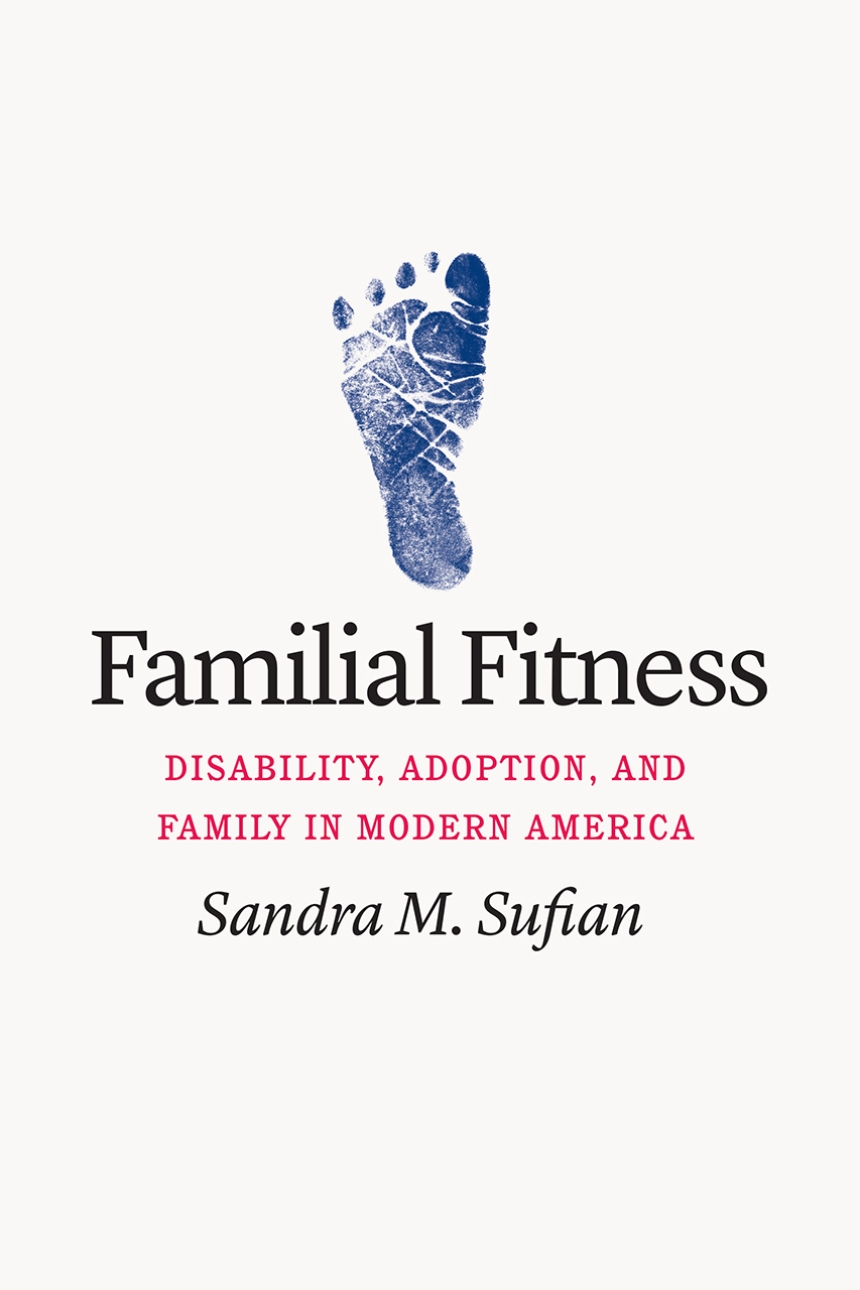
Sandra M. Sufian, Familial Fitness: Disability, Adoption, and Family in Modern America (University of Chicago Press)
The committee shared the following assessment: “Sufian’s study…represents intersectional history at its best by unpacking numerous entanglements such as race, eugenics, and epidemics…The narrative is persuasive in showing how dominant views on normality and health in American society have shifted throughout the century.” Familial Fitness is a “masterful book…The analysis is clear, compelling, and well substantiated.” The book is “a well-argued and rigorously researched history of disability and adoption in the United States. The author shows clear mastery over the legal and systematic structures that dominate Modern American adoption processes.”
2022 Outstanding Article/Book Chapter Award
Winner
Hannah Zeavin, “Hot and Cool Mothers,” differences 32, no. 3 (2021): 53-84.
From the Committee:
This article was remarkable, and entertaining. The “refrigerator mother” and “helicopter parent” are certainly familiar enough topics, but the approach here based on metaphorical temperature describes a “too much/too little” theory landscape that damned mothers no matter how they acted, and brings together a wide range of philosophical, pop culture, professional and pedagogical supports for its argument.
Zeavin’s article is exceptional in its braiding of feminist history, histories of disabled children, the “creation” of disability, affect theory, discourse analysis, and histories of capitalism, race, and 20th century America. It shifts the conversation on disability away from its pure “existence,” instead unpacking how queerness and neurodivergence are said to be “produced” in ways which stigmatize a variety of mothers. It shows, as such, how disability and disabled children are affectively and linguistically utilized as a tool for misogyny, racism, and ableism, pushing the field to think about disability more broadly than impairment. It is clear, argumentative, and theoretically adept, further encouraging the field to consider the ways in which the figure of the divergent child is leveraged to debilitate certain people and groups.
This was a truly fascinating article. Zeavin’s research is thorough and thoughtful, exploring the ways that maternal etiology, metaphors, and diagnoses are inseparable from predominant assumptions of race and class. I particularly appreciated the clear organization of Zeavin’s article and her use of primary sources. Most compelling was her discussion of how maternal metaphors and the problems of stimulus have continued in our own present moment. Her research powerfully demonstrates how in the twentieth century mothers lost their status as individuals to become stimulus conditions.
This is a fascinating article that explores research in behavioural science between the 1940s and 1960s that looked at the impact of styles of mothering on child development. Research on ‘refrigerator mothers’ who were blamed for autism is well known, but the article uncovers a range of other ‘hot’ and ‘cool’ styles of mothering that were deemed to harm a child’s development. These centred on theories of maternal absence and (over) presence. Excess of stimulation (whether in the form of infantilization, protection, or permissibility) begat different pathological states and each specific subtype of hot mother produced her own subtype of pathological child. There is a fascinating analysis of the metaphors of parenting and how they relate to material culture of post-War America. This is a beautifully written and researched article that ranks highly.
Honorable Mention:
Evan P. Sullivan, “America’s living unknown soldiers: amnesia and veteran imposters after the Great War,” First World War Studies 12, no. 2 (2021): 155-171.
From the Committee:
The case studies are presented in a fascinating and compelling way and are used to present a more subtle understanding of a common theme in disability history – the faking of impairments and suspicion of disabled people.
[The author’s] exploration into neuro-psychiatric wounds—and amnesia in particular—was well researched. Sullivan brought out integral questions relating to the legitimacy of hidden disabilities and the ways in which they challenged assumptions about status, gender, and race… Impressive use of primary sources.
Sullivan’s piece is tightly written, comprehensive, argumentative, and chronologically clear. It reads accessibly and easily. Sullivan’s elucidations of the web of anxiety in the post-war era of disability fakery, familial grief, a national desire to “return” to normalcy, and restrictive welfare are masterful.
Such a fascinating subject, and with resonances for so many other disability history subjects around grief and passing.
2021 Outstanding Book Award
Winner
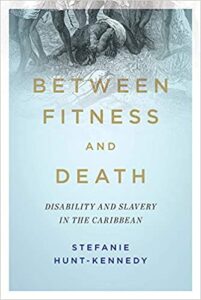 Stefanie Hunt-Kennedy, Between Fitness and Death: Disability and Slavery in the Caribbean (University of Illinois Press, 2020).
Stefanie Hunt-Kennedy, Between Fitness and Death: Disability and Slavery in the Caribbean (University of Illinois Press, 2020).
From the committee:
Between Fitness and Death is “an insightful and powerful study” that looks to early modern “West Indian slavery and the legal exploitation of black bodies to argue that “slavery disabled the human.” It is “methodologically rich,” “elegantly and thoroughly researched, argued, and written,” and expands scholarly capacities for attending to the interconnections between disability and race. “From accounts framing monstrosity as an element of deformity to fitness tests at British slave markets, this study unravels the ways in which early modern ideas of race were tied to perceptions of disability — a systematic connection that, at its most effective, reverberated through slave laws that allowed for violence against the Black body. “Compelling, fascinating. An important contribution.”
Honorable Mention
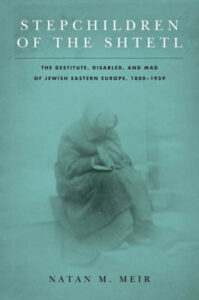 Natan Meir, Stepchildren of the Shtetl: The Destitute, Disabled, and Mad of Jewish Eastern Europe, 1800-1939(Stanford University Press, 2020).
Natan Meir, Stepchildren of the Shtetl: The Destitute, Disabled, and Mad of Jewish Eastern Europe, 1800-1939(Stanford University Press, 2020).
From the committee:
“Beautifully written and compellingly argued,” Stepchildren of the Shtetl “explores the ways that marginalized people came to be understood within the framework of disability.” It is an “extraordinary study of the lived experiences of Jewish outcasts — the impoverished, disabled, and chronically ill — in Eastern Europe that deftly depicts the simultaneous perception of marginalized people as forerunners of modernity and as symbols of inadequacy.” Disabled Jewish people are “richly depicted and contextualized within religious and literary meanings and histories.” As such, Meir’s is a novel contribution to the field of disability history.”
2021 Outstanding Article/Book Chapter Award
Stefanie Hunt-Kennedy, “‘Had his nose cropt for being formerly runaway’: disability and the bodies of fugitive slaves in the British Caribbean,” Slavery & Abolition 41.2 (2020): 212-233.
From the committee:
“This article adopts a sophisticated conception of debility – including discursive and legal forms of social marking and exclusion – to better understand the intersection between disability and slavery’s violence. It also does important work is broadening our histories of disability beyond the United States and Britain.”
“The making of white disability and black disability is a very important and novel subject, and this article uses rich archival sources to advance its central thesis … It must have been difficult to research and write this, but it is very well written and I kept thinking about it long after I finished reading it.”
“An innovative study on how disability was racialised as a control and punishment regime in the eighteenth century with the consequences, in the eyes of slaveholders, to leave these slaves (if allowed to live) as impaired but still ‘ablebodied’.”
2020 Outstanding Book Award
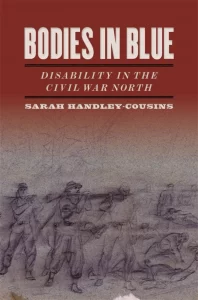 Winner
Winner
Sarah Handley-Cousins, Bodies in Blue: Disability in the Civil War North (Athens, GA: University of Georgia Press, 2019).
From the committee:
“Handley-Cousin’s book painstakingly analyzes… a wide variety of disabilities and impairments drawn from across the historical record of the Civil War and its aftermath.
“Bodies of Blue broadens and deepens the historical study of Americans with disabilities, thereby simultaneously expanding both American History and Disability History.”
“Well-written and carefully worded, Bodies in Blue demonstrates historical research and writing at its best.”
“Handley-Cousins’s work is written with sensitivity and detail that will interest the general public and academics alike.”
Honorable Mention
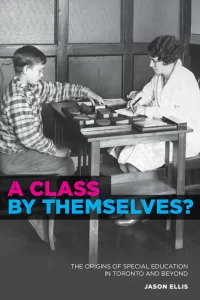 Jason Ellis, A Class by Themselves? The Origins of Special Education in Toronto and Beyond (Toronto: University of Toronto Press, 2019).
Jason Ellis, A Class by Themselves? The Origins of Special Education in Toronto and Beyond (Toronto: University of Toronto Press, 2019).
From the committee:
“a clearly written, well-organized overview of the history of auxiliary or special education for disabled children in Toronto, Canada, public schools, in the early twentieth century.”
“…thoughtfully and meticulously combines historical evidence…”
“… digs deep into institutional records left by educators and other professionals, skillfully coaxing details from pupil records that show how children and their parents often wielded their own agency…”
2020 Outstanding Article or Book Chapter Award
Winner
Coreen Anne McGuire, “The Categorisation of Hearing Loss in Inter-War Telephony,” History and Technology 35.2 (September 2019): 138-155.
From the committee:
‘A splendid piece, with great use of disability studies scholarship combined with the history of technology.’
‘… explores a largely neglected theme that places an interesting comparison of assumed state responsibility and deaf advocacy.’
‘… well-written, historically grounded, and provides a significant contribution to our understanding of how standards of normality and disability have been historically created outside of the medical sphere.’
Honorable Mention
Sam de Schutter, “A Global Approach to Local Problems? How to Write a Longer, Deeper, and Wider History of the International Year of Disabled Persons in Kenya”, Diplomatica 1 (2019), 2: 221-242.
From the committee:
‘This is a much-needed piece of work on disability in the global South, and it is clearly and cogently presented, making contributions to the history of disability and diplomacy alike.’
And, ‘Revealing on the disconnect between international goals and on the ground realities. Argues that what happened in Kenya had a lot to do with public health practices from the colonial era rather than adherence to international goals.’
2019 Outstanding Article or Book Chapter Award
Winner
Maria Cristina Galmarini-Kabala, “Psychiatry, Violence, and the Soviet Project of Transformation: A Micro-History of the Perm Psycho-Neurological School-Sanatorium,” Slavic Review 77, no. 2 (Summer 2018): 307-332.
From the committee:
“The article is an example of micro-history at its best.”
“This microhistory of a child psychiatric institution makes a compelling argument that expands our knowledge of asylums and social control in the 20th century.”
“An insightful article within a specific period of time, within a specific institution, and under a range of specific regime approaches.”
“The conclusion that “violence existed—in the asylum and in Soviet society—in a continuum of cure and harm” is nuanced, sensitive to current disability scholarship, and extremely useful for scholars. Excellent article!”
Honorable Mention
Natalie Spagnuolo, “Mobilising Historical Knowledge: Locating the Disability Archive,” in Katie Ellis, Rosemarie Garland-Thompson, Mike Kent, and Rachel Robertson (eds.), Interdisciplinary Approaches to Disability: Looking Towards the Future (New York: Routledge, 2018), 153-163.
From the committee:
“… brings together disparate ideas to create a compelling, intelligent and thought-provoking whole.”
“… well written with a sophisticated analysis that will, I hope, start useful conversations in the field about the choices we make in our historical scholarship and the consequences of these choices for present-day disability activism.”
“… provides a nice historiography of broad themes and dilemmas in the field of disability history. Moreover, Spagnuolo raises important questions for the future of the field.”
2019 Outstanding Book Award (Co-Winners)
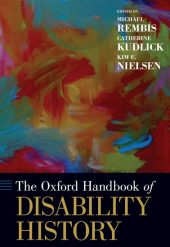 Michael Rembis, Catherine Kudlick, and Kim E. Nielsen, eds., The Oxford Handbook of Disability History (New York: Oxford University Press, 2018).
Michael Rembis, Catherine Kudlick, and Kim E. Nielsen, eds., The Oxford Handbook of Disability History (New York: Oxford University Press, 2018).
From the committee:
“The capacious geographic, conceptual, and methodological reach of The Oxford Handbook of Disability History demonstrates just how far the field of disability history has come in the past two decades. The book also shows the manifold ways in which incorporating disability history promises to help scholars think anew about topics ranging from the histories of gay rights, work, and material culture to the nature of archives and historical documentation.”
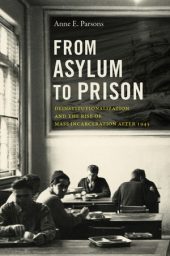 Anne E. Parsons, From Asylum to Prison: Deinstitutionalization and the Rise of Mass Incarceration after 1945 (Chapel Hill: The University of North Carolina Press, 2018).
Anne E. Parsons, From Asylum to Prison: Deinstitutionalization and the Rise of Mass Incarceration after 1945 (Chapel Hill: The University of North Carolina Press, 2018).
From the committee:
Praise from the committee: “Lucidly written, Parsons’ powerful account places disability at the center of the burgeoning histories of mass incarceration and the prison industrial complex. From Asylum to Prison is especially compelling and insightful in the way it brings together race, prisons, the disability rights movement, and the related yet distinct deinstitutionalizations of people diagnosed with psychiatric disabilities and those labeled as having intellectual or developmental disabilities. Always attentive to historical complexities and the unintended consequences of policymaking, Parsons shows how we cannot fully understand the rise of mass incarceration without incorporating disability.”
2018 Outstanding Article or Book Chapter Award
Winner
Laurel Daen, “Martha Ann Honeywell: Art, Performance, and Disability in the Early Republic,” Journal of the Early Republic 37, no.2 (2017): 225-250.
From the committee:
The article, “fits into the often-debated genre of ‘freakery’ by offering a well-researched case study of Martha Ann Honeywell. Daen positions Honeywell as exploiting her identities of being both disabled and enabled, and ultimately being able to exercise her own agency in ‘exhibitionism’, capitalising on curiosity surrounding her physical appearance, but also her craftsmanship in various forms of artistic expression. [Daen] argues that Honeywell was not exploited, but capitalised on various attributes to exercise agency and be independent, while knowing how to manage the expectations of her target audiences through conforming to their prejudices surrounding gender, social class, gentility and American-ness.”
“Superb Scholarship!”
It “draws on a wide array of sources” to uncover the “interplay of disability, gender, and vocation in the life of an artist,” and “demonstrates how Honeywell’s career invoked and was grounded in broader ideas about disability itself.”
Honorable Mention
Russell Johnson, “‘Better Gestures’: A Disability History Perspective on the Transition from (Silent) Movies to Talkies in the United States,” Journal of Social History 51, no. 1 (Fall 2017): 1–26.
From the committee:
Johnson’s work offers a “fascinating portrayal of the complicated relationship between the arrival of talkies and the ascendency of oralism in the 1920s. It uses a wide range of sources to trace how spoken language came to dominate both movies and deaf schooling in this era, thereby enforcing normalcy in language, education, and the cinema.”
“…theoretically sophisticated.”
“‘Better Gestures’” brings “innovative attention to linkages and influences in late 1920s USA to the culmination of the ascendency in oralism by its advocates, and the effects of ‘talkie’ cinematography on marginalizing signing movie viewers from an entertainment where they had found near-equality with hearing people.”
2018 Outstanding Book Award
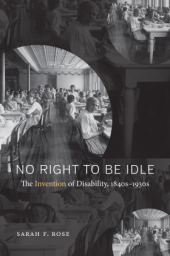 Winner
Winner
Sarah F. Rose, No Right to Be Idle: The Invention of Disability, 1840s-1930s (Chapel Hill: The University of North Carolina Press, 2017).
From the committee:
It “is a much-needed examination of how ideas about bodily difference and productivity became linked during the nineteenth century, and an exploration of the contradictions inherent in the suggestion that disability meant an inability to perform labor – most importantly… in the ways that figures of authority called for the institutionalization of apparently unproductive disabled people, but at the same time reinvigorated economically-strapped institutions by giving them unlimited access to the unpaid labor of these ‘unproductive’ inmates. In this way, such unpaid labor stopped being work and became, instead, therapy.”
No Right to Be Idle “ably tackles one of the big themes of disability — its connection to the labor force — and gives us a fundamental recalibration in how people with disabilities were labeled and pushed out of the labor force rather than having ex ante impairments that made them ‘unfit’ laborers. It shows the malleability of the disability label within historical context.”
Honorable Mention
Molly Ladd-Taylor, Fixing the Poor: Eugenic Sterilization and Child Welfare in the Twentieth Century (Baltimore: Johns Hopkins University Press, 2017).
From the committee:
“This book clearly and powerfully argues for a reconceptualization of the history of American eugenics, one … focused on the practical needs and desires of impoverished, institutionalized people themselves.” It “ties eugenics to broader welfare state policies.” “Carefully researched and powerfully argued!”
2017 Outstanding Article or Book Chapter Award
Winner
Laura Micheletti Puaca, “The Largest Occupational Group of All the Disabled: Homemakers with Disabilities and Vocational Rehabilitation in Postwar America,” in Disabling Domesticity, ed. Michael Rembis (New York: Palgrave Macmillan, 2016), 73-102.
From the committee:
“[Puaca] analyzes the importance of gender and broader conceptualizations of work. If much of the definition of disability is tied to gainful employment, this piece really broadens both the definition of disability and that of work itself.”
“Puaca’s article is well-researched and well-written. She brilliantly weaves together economic, gender, disability, and policy histories providing new and important insights into the dominant postwar and social movements narratives.”
Honorable Mention
Rabia Belt, “Ballots for Bullets?: Disabled Veterans and the Right to Vote,” Stanford Law Review 69 (February 2017): 435-490.
From the committee:
““Ballots for Bullets?” skillfully examines why and how Civil War veterans housed in charitable institutions were systematically disenfranchised. Through a careful reading of a wealth of court cases, state hearings, and newspaper articles, Belt focuses on veterans who experienced mental trauma to challenge the dominant narrative of disabled veterans holding a privileged place among people with disabilities. The result is a major contribution to both Disability Studies and U.S. History.”
Sarah Handley-Cousins, “‘Wrestling at the Gates of Death’: Joshua Lawrence Chamberlain and Nonvisible Disability in the Post-Civil War North,” The Journal of the Civil War Era 6 (June 2016): 220-242.
From the committee:
“A haunting and rigorous examination of the oft-ignored dynamics of non-visible disability in Civil War America. Through the case study of a single Union solider Handley-Cousins traces the contentious process, which sought to demarcate disability from ability via the rubrics of gender, racial identity and the state. Evincing deep archival research with theoretical acumen and a lively and engaging writing style this paper effectively and eloquently blurs the borders of disability.”
2016 Outstanding Book Award
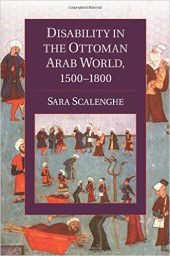 Winner
Winner
Sara Scalenghe, Disability in the Ottoman Arab World, 1500-1800 (New York: Cambridge University Press, 2014).
From the committee:
“Wonderful intervention on disability history: unique for its non-Western and pre-modern focus (as well as its points about “academic imperialism” in disability history)… Terrific examples and analysis of contingencies and ‘loopholes’ in Ottoman legal practices and categories.”
“[Disability in the Ottoman Arab World is an] excellent contribution to disability history that helps open up a new and much needed non-Western (and preindustrial) perspective in the field. Beautifully written in clear and accessible prose, Scalenghe’s book is also a very enjoyable read.”
“… accessible and informative. [Disability in the Ottoman Arab World] continues the important work of globalizing disability studies; it opens up new possibilities for comparative approaches; and it challenges the category of disability itself.”
Honorable Mention
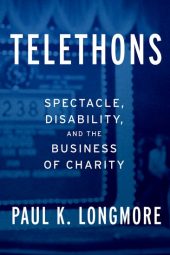 Paul K. Longmore, Telethons: Spectacle, Disability, and the Business of Charity (New York: Oxford University Press, 2016).
Paul K. Longmore, Telethons: Spectacle, Disability, and the Business of Charity (New York: Oxford University Press, 2016).
From the committee:
“[Telethons is a] superb study and a model of how to write disability history. Longmore’s book will surely be consulted by disability scholars and historians for years to come. Engagingly written and full of profound insights into a wide range of issues, it compellingly demonstrates the significance of disability to modern American culture.”
“… in-depth look at a common cultural phenomenon in America, impressive research and consideration of different factors (gender/social class, etc.), well-written and cited… [Longmore makes an] important intervention into the links between politics, the media, and private interests in constructing and presenting disability in modern U.S. discourse.”
2015 Outstanding Article or Book Chapter Award
Winner
Dea H. Boster, “‘I Made Up My Mind to Act Both Deaf and Dumb’: Displays of Disability and Slave Resistance in the Antebellum American South,” in Disability and Passing: Blurring the Lines of Identity, ed. Jeffrey A. Brune and Daniel J. Wilson (Philadelphia: Temple University Press, 2013), 71-98.
From the committee:
“In her article Boster sets off for an intriguing historical journey along the intersection of disability and race in antebellum American history. She does so in a manner that is perfectly in line with up to date disability studies perspectives, namely examining history in order to demonstrate that disability (the concept as well as the embodied experiences) cannot be summarized by adjectives like passive, dependent and repugnant. On the basis of impressive historical source analysis Boster convincingly shows how slaves made use of the category and reality of disability in order to resist their actual living conditions. By feigning to be disabled they sought to change their lives for the best – hoping to become free citizens or to be released from work for some time. By demonstrating that disability, in Boster’s words, became “a contested space for masters and slaves to negotiate authority over enslaved bodies” she opens up a promising field of historical research and demonstrates the value of the cultural model for disability historians. Moreover, and equally important, she has included Sieber’s concept of masquerade into her analyses which resulted in a perfect blend of historical craftsmanship and theoretical capacity. This is an engaging paper, connecting the histories of slavery and disability and asserting the deployment of disability as a means of agency and empowerment. Boster focusses on the intersection between race and disabilities and shows how the construction of disabilities becomes apparent. By taking up different perspectives the paper shows vividly how disabilities were used for strategic life planning in the past. Furthermore, by turning to aspects of resistance, the narrative shows how disabilities framed identities over the time.”
Honorable Mention
Daniel Blackie, “Disability, Dependency and the Family in the Early United States,” in Disability Histories, ed. Susan Burch and Michael Rembis (Urbana: University of Illinois Press, 2014), 17-34.
Stacy Clifford, “The Capacity Contract: Locke, Disability, and the Political Exclusion of ‘Idiots’,” Politics, Groups, and Identities 2 (2014): 90-103.
2014 Outstanding Book Award
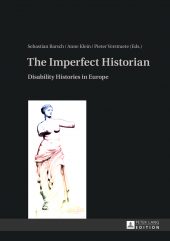 Sebastian Barsch, Anne Klein, and Pieter Verstraete, eds., The Imperfect Historian: Disability Histories in Europe (Frankfurt am Main: Peter Lang, 2013).
Sebastian Barsch, Anne Klein, and Pieter Verstraete, eds., The Imperfect Historian: Disability Histories in Europe (Frankfurt am Main: Peter Lang, 2013).
From the committee:
“Drawing primarily, but not exclusively, on the provocative and far-reaching insights of the French philosopher Michel Foucault, The Imperfect Historian makes important methodological contributions to the field of disability history. Its temporal and geographic breadth and its deliberate engagement with theory and the methodologies of disability history are refreshing and provide a powerful framework for future historical investigation. Although the stated focus of this edited collection of historical essays is on Europe, various chapters explore disability history in Argentina, Brazil, and Spain and British Mandate Palestine and Israel, challenging the way we think about national boundaries. The seemingly disparate collection of essays that span Medieval and Early Modern European societies and late-twentieth century HIV/AIDS discourse are held together nicely by the volume’s strong focus on postmodern theorizations of identity, bio-politics, narrative, and governmentality. In clearly written, accessible prose, the contributors to this innovative volume challenge existing historiography and frameworks for understanding disability history.”
2013 Outstanding Article or Book Chapter Award
Winner
Audra Jennings, “‘An Emblem of Distinction’: The Politics of Disability Entitlement, 1940-1950,” in Veterans’ Policies, Veterans’ Politics: New Perspectives on Veterans in the Modern United States, ed. Stephen R. Ortiz (Gainesville: University Press of Florida, 2012), 94-116.
From the committee:
“In many ways, Jennings’ essay is both exemplary and exceptional disability history. Beautifully written and powerfully argued, Jennings’ work situates the voices and experiences of disabled people at the center of her analysis. She explains why rehabilitation and employment programs for people with physical disabilities grew exponentially in the United States after World War II, but were made available largely only to disabled veterans. Civilian disability activists and liberal policy makers had hoped to use the post-war interest in disability to “create a broader social safety net for all Americans.” This, however, was not to be. Veterans and their allies claimed that they deserved rehabilitation and employment assistance because of their sacrifice and service for the nation. While a powerful political and organizing strategy, this argument excluded large numbers of disabled Americans from disability policy. Much can be learned from this analysis of unfortunate but consequential divisions — ideological as well as organizational — in the early U.S. disability rights movement.”
Honorable Mention
Jay Dolmage, “Disabled Upon Arrival: The Rhetorical Construction of Race and Disability at Ellis Island,” Cultural Critique 77 (Winter 2011): 24-69.
Douglas C. Baynton, “‘These Pushful Days’: Time and Disability in the Age of Eugenics,” Health and History 13, no. 2 (2011): 43-64.
David Serlin, “Carney Landis and the Psychosexual Landscape of Touch in Mid-20th-Century America,” History of Psychology 15, no. 3 (August 2012): 209-216.
2012 Outstanding Book Award
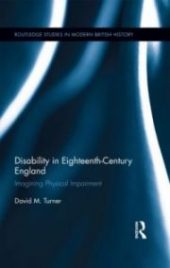 David M. Turner, Disability in Eighteenth-Century England: Imagining Physical Impairment (New York: Routledge, 2012).
David M. Turner, Disability in Eighteenth-Century England: Imagining Physical Impairment (New York: Routledge, 2012).
The selection committee very much appreciated the book’s wide scope, deep engagement with disability history and theory, and the ways Turner used archival sources both to make an overarching argument and reveal individual stories from both elites and the lower classes. Disability in Eighteenth-Century England weaved the ideas of popular culture and individual representation together in nuanced and often humorous, but always respectful, ways. Turner’s witty and very readable prose combined with his thorough analysis of archival material make Disability in Eighteenth-Century England as a must-read for students and specialists.
